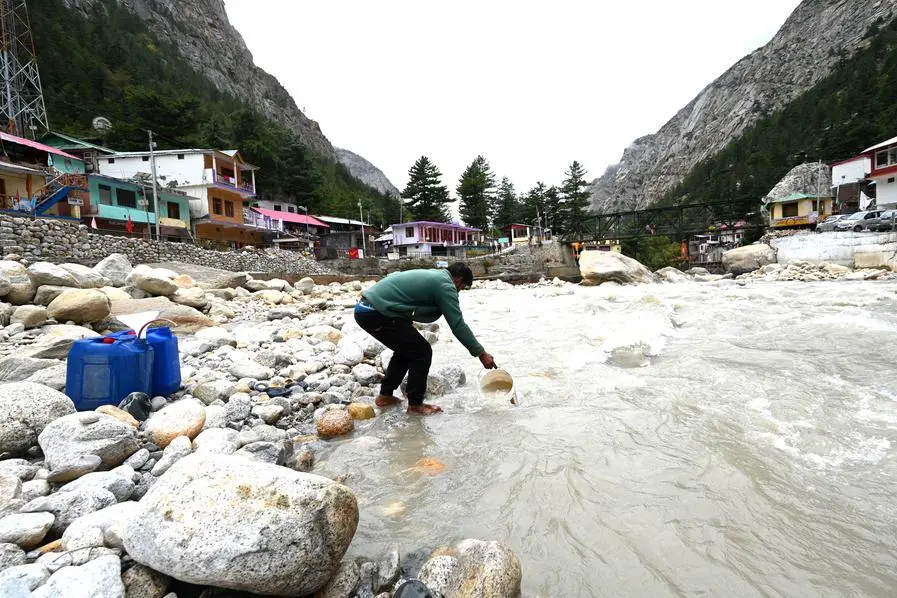PHOTO
Gangotri, IndiaI: High in the Himalayas, where the mighty Ganges is still a frigid glacial stream, labourers fill jerry cans with its holy waters to be distributed to Hindus all over India.
Buyers sparingly use the precious liquid to bless important occasions, from births, weddings, and funerals to festivals such as Diwali or the purchase of a new car.
"This is for every faithful Hindu who can't get here personally," said one of the workers in the pilgrimage town of Gangotri, giving his name as Ramesh.
"It feels blessed to be part of a project that reaffirms our Hindu faith and delivers this divine water to all corners of the country," he told AFP.
The scheme is run by the Indian postal service and is one example of a raft of initiatives, from the symbolic to the gargantuan, launched by Prime Minister Narendra Modi promoting Hinduism in the country 75 years after independence.
The water is considered purest closest to its source so is collected in Gangotri, where the Ganges starts its roughly 2,500-kilometre (1,550-mile) journey across India, and trucked to a bottling plant 100 kilometres downstream.
After being left to settle for three or four days, it is filtered in tanks before workers decant it by hand into 250-millilitre plastic bottles.
Bought over the counter at post offices around India, they cost just 30 rupees ($0.37) each -- customers can also order them online for home delivery at 321 rupees for a pack of four.
Millions of the little containers have been sold since the scheme launched six years ago.
Hindu highway
Since winning elections in 2014, Modi has put Hinduism front and centre of his government in the officially secular nation of 1.4 billion.
The core tenet of Modi's Bharatiya Janata Party (BJP), and its militaristic ideological parent the Rashtriya Swayamsevak Sangh, is that Hinduism is India's original religion.
This worries India's 210 million Muslims and other minorities. Social media is rife with hate speech and attacks on Muslims and Christians have risen, activists say.
Modi's biggest religious construction project is a grand temple being built in the ancient city of Ayodhya.
Hindu zealots destroyed a centuries-old mosque there three decades ago, triggering sectarian violence that killed more than 1,000 people -- most of them Muslims.
The government has also pushed a $1.5-billion highway project in the northern state of Uttarakhand, which will make it easier for Hindu pilgrims to reach Gangotri and three other Himalayan temples.
The sites already receive hundreds of thousands of devotees each year, and environmental activists are concerned about building grand highways and tunnels in the ecologically sensitive region.
Modi's government has made clear it will not let up on its vision, however, channelling money into researching the properties of cow urine -- a sacred animal in Hinduism -- and finding "proof" of legends in Hindu scriptures.
Some school textbooks have been rewritten to airbrush the role played by Muslims in Indian history, while Islamic-sounding names of cities have been changed.
Special delivery
These "dramatic initiatives... create an ethos of a majoritarian nation and sublimely reinforce the feeling that we now see ourselves as a de-facto Hindu country," said Hartosh Singh Bal, political editor of The Caravan, an Indian English-language magazine.
"Modi knows exactly what he's doing," he added.
"If critics now raise concerns about minorities or injustice, they can be labelled as someone who's against such schemes delivering holy Ganges water -- and shut them up."
Recipients of the precious liquid, though, have no such concerns.
New Delhi postman Rupesh Kumar, 23, has made several deliveries of the holy water, including during the current auspicious festive period.
He feels "additional responsibility" whenever he is carrying it to a customer for their ritual needs, he told AFP.
"We also used Ganges water in the family for all special and religious occasions," he said.
"People are often very thankful and polite after I deliver these bottles to their homes."
© Agence France-Presse





















